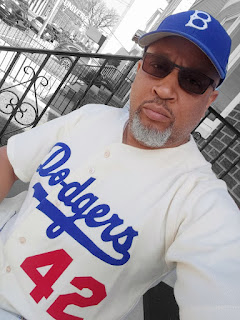As many know, somewhere around the start of the pandemic, I developed a fascination for the old "Negro Leagues" which I had little interest in prior to the pandemic. I wanted to learn as much as I could about the various Negro Leagues during that year-long "stay-at-home." I became so intrigued by the Negro Leagues that over the past two years, I have purchased over 50 authentic, flannel Negro League jerseys which I proudly wear on my Virtual AP Leadership Academy live stream every Saturday morning.
My fascination for the Negro Leagues is rooted in American History. From 1920 when the first of several Negro Leagues was founded through 1947 and beyond, the Negro Leagues were home to some of the most phenomenal baseball players ever born. Notice, I didn't say Black baseball players....I said baseball players. Jackie Robinson was one of them along with the likes of Satchel Paige, Josh Gibson, Cool Papa Bell, Buck O'Neil, Buck Leonard, Larry Doby, Monte Irvin, Henry Aaron, Willie Mays and Ernie Banks just to name a small few. What these men accomplished is nothing short of amazing. But because they were born Black...let me say that again...BECAUSE THEY WERE BORN BLACK, THEY WERE NOT LEGALLY PERMITTED TO PLAY IN THE MAJOR LEAGUES WITH WHITE BASEBALL PLAYERS....BECAUSE THEY WERE BORN BLACK. So in other words, despite the fact that they had extraordinary skill and ability which would help any team to win a pennant or World Series, it didn't matter. They were born Black in America. The Supreme Court landmark decision - Plessy vs. Ferguson which legalized segregation in America ensured that their opportunity to play in the Majors would be denied.
Of course, as Jackie Robinson (National League) and Larry Doby (American League) entered the Majors in 1947, they had to endure extreme racial hatred both on the field and off. In fact, Jackie was selected because it was felt that he had the temperament to endure it. It is widely accepted that not only was he not the best player in the Negro Leagues, but he wasn't even considered the best on his team, the Kansas City Monarchs. But it was felt that he had the temperament to endure the racism that was going to accompany his arrival to the "Big Leagues." Nevertheless, he went on to become Rookie of the year in 1947 and Major League MVP in 1949. That speaks volumes.
What's interesting for me with all of this is that in schools undergoing "Critical Race Theory hysteria," a teacher could potentially get in "good trouble" if they teach what I have written here or go more in depth toward telling the children the truth about the racism, segregation, etc. in general and in baseball in particular. But at the end of the day, the story must be told in its fullness. Retiring Jackie's number 42 across the league and having all Major League players wear his number today (annually) along with all of the other celebrations is not enough. Even watching the various Jackie Robinson movies is not enough. The children must be educated. Black children, white children, all children must be enlightened to the truth of American history and its ugly racist historical past. There is no healing in hiding truth. There is no healing in perpetuating "feel good" stories and falsehoods. Black children need to learn who that is in their mirrors historically and white children need to learn of the greatness of Black people across genres.
Lastly, one cannot teach what one does not know. How can a teacher do justice to content that the teacher has never been exposed to? How can a teacher teach that which has no mention in a curriculum. The whole system has to change. The future teachers of America...meaning the children in today's classrooms MUST BE INFORMED OF THE TRUTH OF AMERICA. Why? Because a percentage of those children are going to one day become America's next teachers....and quite uninformed and ill-prepared to give the children the sort of content that they require in the context of this post (essay). Again, the system must change.
One last thought. The first of several of the Negro Leagues was founded by a Black man by the name of Rube Foster in Kansas City, MO in 1920. Many of the teams were owned by African American owners. I've often thought to myself, what if so many of the Negro League players didn't migrate over to the Majors and instead there was a commitment to growing and sustaining this league? Just a thought. #bam

.jpg)
